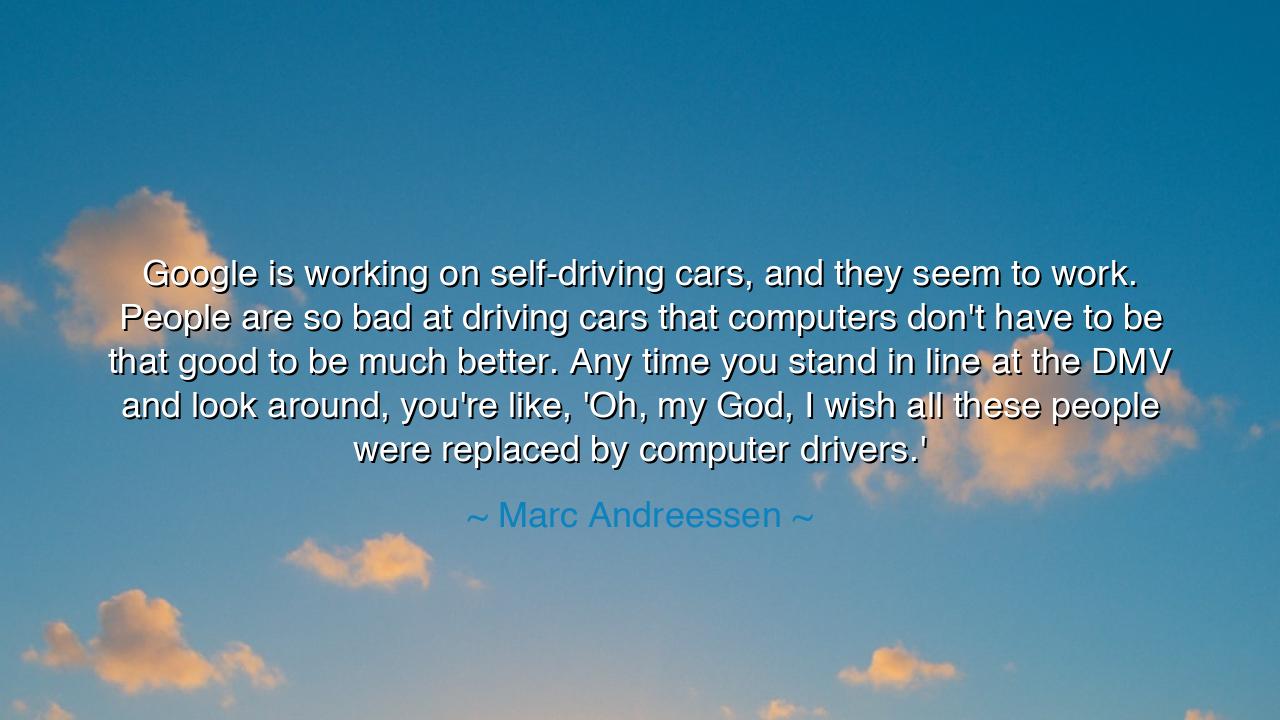
Google is working on self-driving cars, and they seem to work.
Google is working on self-driving cars, and they seem to work. People are so bad at driving cars that computers don't have to be that good to be much better. Any time you stand in line at the DMV and look around, you're like, 'Oh, my God, I wish all these people were replaced by computer drivers.'






In the vast and boundless march of progress, there are moments when we are faced with truths that both humble and astound us. The great Marc Andreessen, in his reflection on the future of technology, once quipped, "Google is working on self-driving cars, and they seem to work. People are so bad at driving cars that computers don't have to be that good to be much better. Any time you stand in line at the DMV and look around, you're like, 'Oh, my God, I wish all these people were replaced by computer drivers.'" With this simple statement, he delivers a profound commentary on human frailty, the inevitability of technological advancement, and the potential for machines to surpass even our most basic skills.
Let us consider the ancient world, where the horse and chariot were the pinnacle of transport and speed. The people of that age would have never imagined that one day, the need for charioteers would be replaced by the very tools they invented—the wheel and the harness of technology. Just as the wheel once revolutionized travel, so too will self-driving cars transform our very relationship with mobility. Andreessen’s words reveal the gap between human capacity and the vast potential of innovation, showing that, in many ways, machines are destined to exceed our capabilities, even in the most ordinary tasks.
Consider the historical tale of the Roman Empire, where the roads were meticulously crafted, yet their charioteers, despite their skill, often faced the limitations of their own human flaws. Imagine the perilous journeys, where the very speed of the horses could lead to chaos. Now, compare this to the self-driving cars of our time—machines that not only drive without error but adapt to changing circumstances with precision and grace. This stark contrast between ancient skill and modern technology highlights how far we have come, and perhaps how far we still have to go.
In Andreessen’s humor, there is a deeper truth. Human beings, despite our ingenuity, are deeply flawed creatures—our errors are as common as the air we breathe. From misjudging a turn to succumbing to distractions, the act of driving exposes the imperfections woven into our very nature. The DMV line, that most sacred of human experiences, serves as a metaphor for all our shortcomings, a reminder of the endless potential for chaos in a world driven by human hands alone. It is here that the promise of technology comes into focus, offering a solution to the mistakes we cannot seem to escape. Through the lens of self-driving cars, Andreessen calls attention to the simple fact that we, as a species, may no longer be the best stewards of our own creations.
In the present age, Google’s self-driving cars are but a glimpse into what may be the future. Machines designed to think and act with unparalleled precision, operating without the distractions of emotion, fatigue, or error, offer a promise of safety and efficiency that human drivers cannot provide. We are on the precipice of a transformation so profound, it can only be compared to the great technological shifts of the past—like the discovery of fire, the advent of written language, or the harnessing of electricity. Self-driving cars are not just vehicles; they are symbols of what is to come, harbingers of a new era where human limitations are surpassed by the very tools we create.
But what, then, is the lesson to be learned from this moment? It is not simply that machines will replace us, but that we must recognize our imperfections and embrace the tools that offer us solutions. Just as ancient architects understood the need for precise instruments to build their great temples, so too must we use technology to build a safer, more efficient world. In Andreessen’s words, there is a call to let go of our pride, to acknowledge that we are not perfect, and that our creations can sometimes be more capable than we are. Rather than resist, we must embrace the new, for it is through innovation that we overcome the limitations of the flesh and the mind.
The path forward, then, is clear. Do not fear the rise of technology; instead, recognize it as an opportunity to transcend our flaws. As you move through your days, reflect on the ways that technology already enhances your life—whether in the form of a self-driving car or a simple tool that makes your work easier. Learn to use the tools that are given to you, not as crutches but as partners. Strive for mastery over your own limitations, and in doing so, embrace the wisdom of the age: progress is not the enemy, but the ally that will propel us to greater heights. Through this, we honor the ancient spirit of invention while looking to the future with open arms, ready to embrace whatever comes next.






AAdministratorAdministrator
Welcome, honored guests. Please leave a comment, we will respond soon